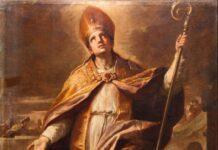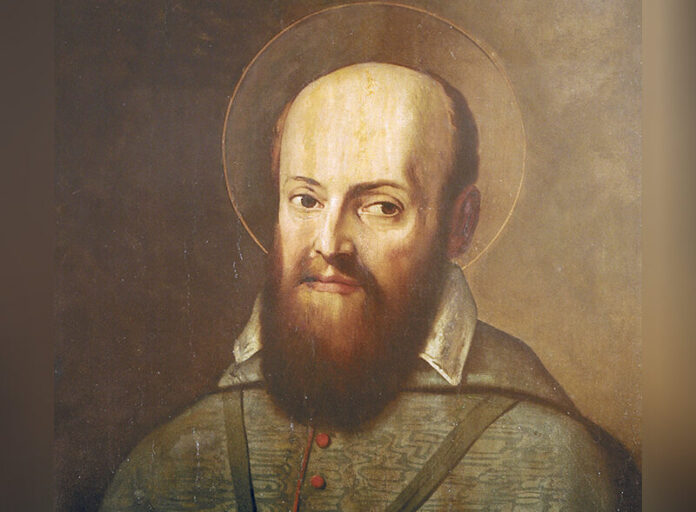A man of strong temper, who, with the help of grace, was able to master himself to the point of being known and venerated by all as the saint of gentleness and kindness: Saint Francis de Sales.
Gaudium Press English Edition
Newsdesk (02/08/2022 1:15 PM, Gaudium Press) The firstborn of the Baron de Boisy, Francis was born in 1567 in the castle of Sales, in Savoy, at that time an independent country that encompassed territories now belonging to France, Italy, and Switzerland. His mother, Dona Francisca de Boisy, a very virtuous lady, knew how to instill in him from his earliest childhood a love for Jesus and Mary. Perhaps it was also from her that he received the salutary influence that allowed him to acquire one of the virtues that most characterized him: never losing his temper, never worrying, having his soul entirely in his hands.
His mother taught him catechism and narrated to him beautiful examples of the lives of the saints. This gave birth in little Francis’ soul to the desire for sanctity and zeal for the things of God.
Since his childhood he was always very active and full of life. A picturesque fact of his childhood denotes his combative but irascible character. When he was still very young, he had heard about the Calvinists who had dominated Switzerland and a good part of France. One day, he learned that one of these heretics was visiting his parents’ castle. Since he could not enter the room to protest, he took a stick and, full of indignation, entered the hen house and beat the chickens with sticks, shouting, “Out with the heretics! The poor chickens ran away cackling at their unexpected attacker. They were saved by the servants who managed to get the boy out in time.
This same Francis would come to have such a sweet and kindly temperament that he made Vincent de Paul exclaim when he had the opportunity to live with him, “O my God, if Francis de Sales is so kind, how must you be?”
The battles of youth
In his youth, a great desire was born in him to consecrate himself entirely to God. But his father had other plans. He was sent to Paris to study at the Jesuit college, where he met the good Father Déage, who was his spiritual director. Later he moved to Padua to study Civil Law, as his father wanted, and Canon Law, as the religious ardour of his heart desired. He also practiced fencing, horseback riding, and attended dances.
Living in the grace of God in those environments was not easy, but Francis knew how to avoid dangerous occasions and any friendship that might offend God. At the University, some wicked students, to humiliate him for being so pious, attacked him. Francis, who was expert in the art of fencing, drew his sword and defeated them all. Seeing them disarmed and powerless, he withdrew, saying, “And thank God in whom I believe, for that is why I do you no harm.
When, due to his temperament, his blood rose at humiliations and mockery, he restrained himself in such a way that many thought he was never angry. The devil, seeing it impossible to overcome him with the most common temptations, attacked him violently in a very sensitive and difficult point: the terrible temptation of the despair of salvation.
He was 20 years old when this happened
He had learned Calvin’s doctrine of predestination, and could not get the fixed idea that he was going to condemn himself out of his head. He lost his appetite and sleep. He always told Our Lord that if by His infinite justice He condemned him to hell, he would grant him the grace to continue loving Him in this place of torment. This prayer partially restored his peace of soul, but the temptation always returned. The definitive remedy came when, entering a church in Paris and kneeling before an image of the Blessed Virgin, he prayed the well-known prayer of St. Bernard: “Remember, O most gracious Virgin Mary…” When he finished, thoughts of sadness and despair left him forever, and there came to him the assurance that “God did not send the Son into the world to condemn it, but that the world might be saved through Him” (Jn. 3:17).
Religious life and the Calvinist conquest
Back in the paternal home, at the age of 24, he refused a brilliant marriage and a post in the Senate of the Kingdom. Although against his father’s wishes, he took the post of Dean of Chambéry Cathedral – through the influence of his uncle, Louis de Sales, canon of Geneva Cathedral, who obtained the appointment from the Pope; shortly after he was ordained a priest.
He preached in Annecy and other cities. Although gifted with great culture, his methods were simple, greatly attracting all who heard him.
But his hard battle began when he offered to reconquer Chablais, on the southern shore of Lake Geneva. This region was totally dominated by the Calvinists, whose army would not let the Catholic inhabitants live in peace. On September 14, 1594, the day of the Exaltation of the Holy Cross, with the authorization of Bishop Claude de Granier, Francis de Sales set out on foot for the great mission. He was not lacking in trials. Many times he had to sleep out in the open. On one occasion he took refuge in the top of a tree all night to escape the risk of being devoured by wolves. The next morning, he was rescued by a couple of Calvinist peasants who acquired great sympathy for him.
These peasants later converted, beginning the great religious transformation of the region. Each night, Saint Francis and his Catholic companions went from house to house, throwing under the doors handwritten leaflets in which the false arguments of the Calvinist heresy were refuted. This earned him the title of patron saint of Catholic writers and journalists. These writings were later collected and published under the name Controversies.
A few years later, after hard struggles and persecutions, Chablais was totally converted, and Father Francis was named Coadjutor Bishop of Geneva. To receive episcopal consecration, he made his way to Rome, where Pope Clement VIII himself questioned him on 35 difficult points of theology, in the presence of the College of Cardinals. “No one of those we have examined has earned our approval so completely!”- exclaimed the Pope as he descended from his throne to embrace him.
Prince Bishop of Geneva
Upon the death of Bishop Garnier, St. Francis de Sales took over the vacant office. The saint’s generosity and charity, humility and clemency were inexhaustible. In his dealings with souls he was always kind, without falling into weakness; he knew how to be firm when necessary.
He founded the Order of the Visitation with Saint Jeanne de Chantal, of whom he was spiritual director, in 1604. Among the works he wrote were Treatise on the Love of God, which earned him the title Doctor of the Church, and Introduction to the Devout Life – Philothea, born from notes sent to his cousin, Madame de Chamoisy.
The measure of loving God
“The measure of loving God consists in loving Him without measure.” This teaching of St. Francis de Sales can perhaps sum up his entire existence, for he was but a living example of all that he taught. While he was still alive, there were already devout people who kept as relics the objects he used.
A victim of paralysis, he lost his speech and some of his lucidity, but he soon recovered them. The medical efforts made to save him were to no avail. On his bed he repeated: “I have put all my hope in the Lord; He has heard my plea and brought me out of the pit of misery and the swamp of iniquity.
He died at the age of 56, on the Feast of the Holy Innocents, December 28, 1622. His liver, due to the constant effort to control his rages of anger, had turned to stone. His body was found incorrupt 10 years after his death.
He knew how to live fully the advice of Our Lord in the Gospel: “Learn from me, for I am meek and humble of heart, and you will find rest for your souls” (Mt. 11:29).
St. John Bosco admired him so much that he chose him as the patron of his congregation. And Saint Jeanne de Chantal said of him: “He was a living image of the Son of God, because truly the order and economy of that holy soul was all supernatural and divine.
Text extracted from the magazine Heralds of the Gospel n. 12, January 2003.
Compiled by Roberta MacEwan
































